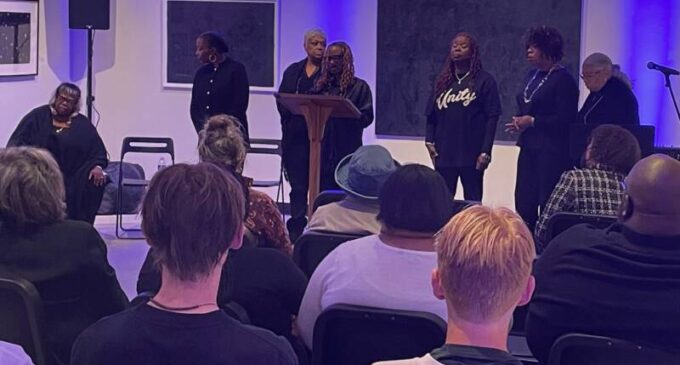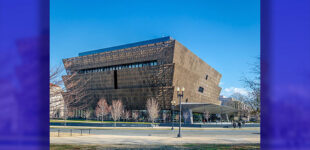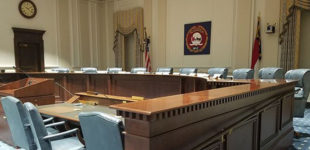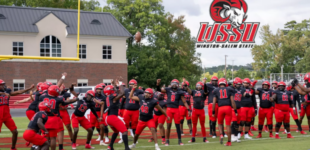Albany Freedom Singers bring ‘Mass Meetings in Memory’ to Hanes Art Gallery
Albany Freedom Singers performed Thursday, March 27, in the Hanes Art Gallery on the campus of WFU to a standing-room only-audience.

By David Winship
Songs from the days of slavery and the civil rights movement filled the Hanes Art Gallery, Scales Fine Arts Center, on Thursday night, March 27, as the Albany Civil Rights Institute Freedom Singers led the ‘Freedom Dreams Mass Meeting’ in joyous recollection of musical soul. Led by original Freedom Singer Rutha Mae Harris, the singers shared background and excerpts from spirituals and songs of protest, as well as coded songs from the era of enslavement, to a standing-room-only gallery.
Dr. Claire B. Crawford, assistant professor of Political and International Affairs and the Program of African American Studies at Wake Forest University, brought the Albany Freedom Singers to campus as part of the Slavery, Race, and Freedom Project. “Six years ago, I heard the Freedom Singers on a visit to Albany, Georgia. I knew that bringing them to Wake Forest was something I had to do.”
Exploring the songs’ storied backgrounds, the Albany Freedom Singers engaged and led the audience through spiritual and gospel numbers made familiar through the historical leadership of the Fisk University Jubilee Singers. One such song was “Wade in the Water,” a coded song of escape from enslavement through the Underground Railroad. Bringing the song histories into the era of the Civil Rights Movement of the 1960s, the Freedom Singers led the audience in the Harry Belafonte-inspired song “Freedom Coming and It Won’t Be Long.” Belafonte’s “Day-O,” written for the labor struggles of dock workers in his ancestral Jamaica, was popular in the 1960s and reworked into a protest-era song.
Along with the Albany Freedom Singers were moving musical performances from Reverend Andria Williamson, Wake Forest alum and associate chaplain and director of chapel programs, High Point University Chapel & Religious Life, who reprised Billie Holiday’s “Strange Fruit” and “Home” from The Wiz. She was accompanied by Mrs. Marcia Dills.
Songs of Collective Deliverance and Genre Diversity included the singing of “I’m Going to Sit at the Welcome Table,” which brought enthusiastic audience involvement. “This Little Light of Mine” was one of the Songs of Unity shared. It was originally a children’s song and a spiritual that was transformed by the nation’s civil rights movement.
Recorded renditions included Nina Simone singing “Young, Gifted, and Black,” as well as Dr. Martin Luther King, Jr. speaking from a Mass Meeting in Birmingham, Alabama in 1963.
Ms. Rutha Mae Harris grew involved with the civil rights movement in her teen years. Recalling her early days of growing up in Albany, Georgia, she shared, “One day I was approached while walking down the street and asked if I wanted to be free. I said, ‘Why are you asking me if I want to be free? I am free.’ The more I thought, I realized I was not free. I discovered there were many things people had gone through that needed to be changed.” She joined the Student Non-violent Coordinating Committee (SNCC) Freedom Singers which led the soundtrack of the civil rights movement. She continues to carry spiritual and movement songs to a new generation.
An appeal to collective freedom dreams came from Rev. Joshuah Brian Campbell, Wake Forest alum and director of worship, music, and the arts, Wake Forest University School of Divinity, and director of the University Gospel Choir. Rev. Campbell spoke of the importance of recognizing and realizing dreams even in the meanness and madness of our present world. He pointed out that the bulletin program of the gathering was printed on paper infused with flower seeds, so the participants could plant their dreams.
The audience was actively singing and engaged when the Albany Freedom Singers sang “If You Miss Me at The Back of the Bus,” a song written by Charles Neblett, adding verses that took charge of the bus and the world at large. “I Shall Not Be Moved,” with a variety of relevant verses, brought enthusiastic participation.
The Mass Meeting closed with the audience joining the Albany Freedom Singers in “Come by here,” which had gained popularity mid-twentieth century as the campfire song, “Kum-ba-ya.”
Surrounding the audience in the Hanes Art Gallery was the exhibit “Young Gifted and Black” from The Lumpkin-Boccuzzi Family Collection of Contemporary Arts.
David Winship is a retired educator and a member of the Appalachian Peace Education Center in Abingdon, Virginia. He has long been involved in social justice issues and organizes programs for Martin Luther King Jr. celebration events. He is a member of Winston-Salem Writers.











There are no comments at the moment, do you want to add one?
Write a comment